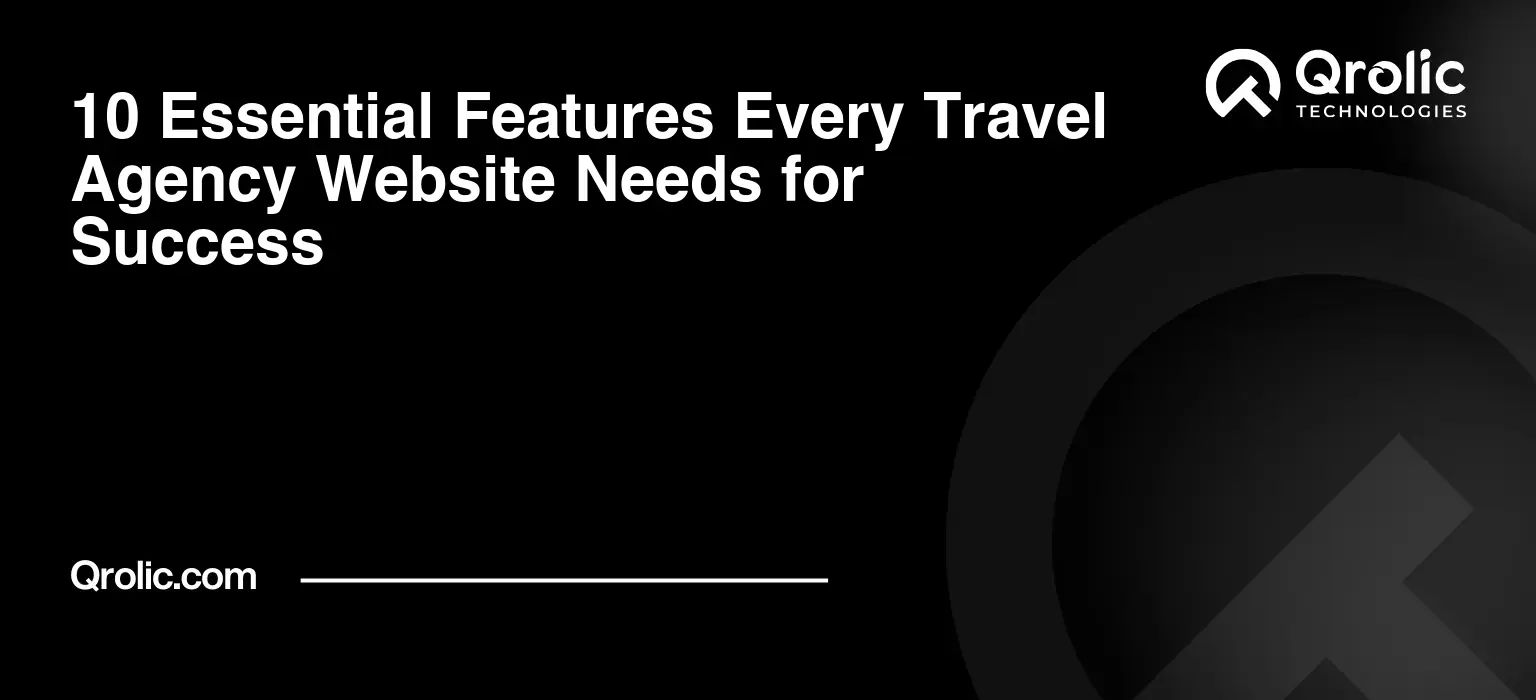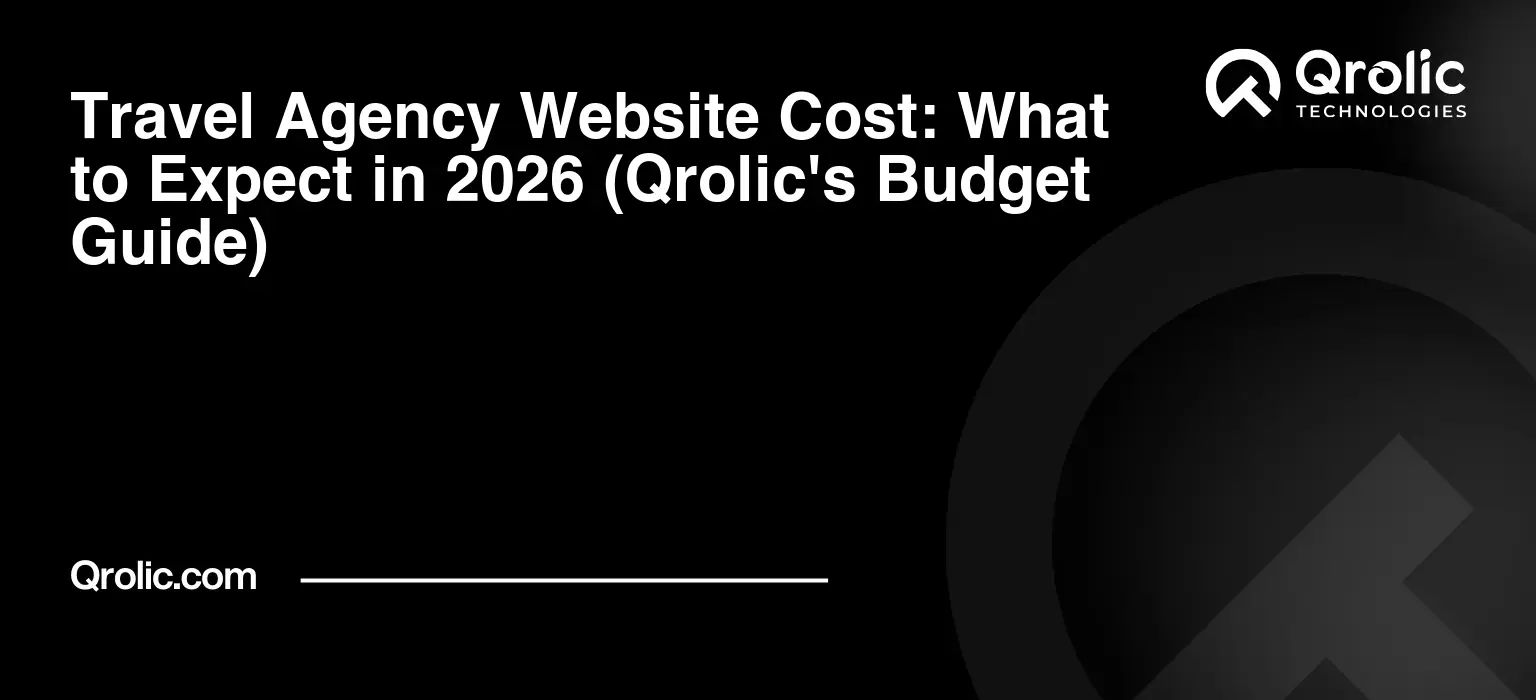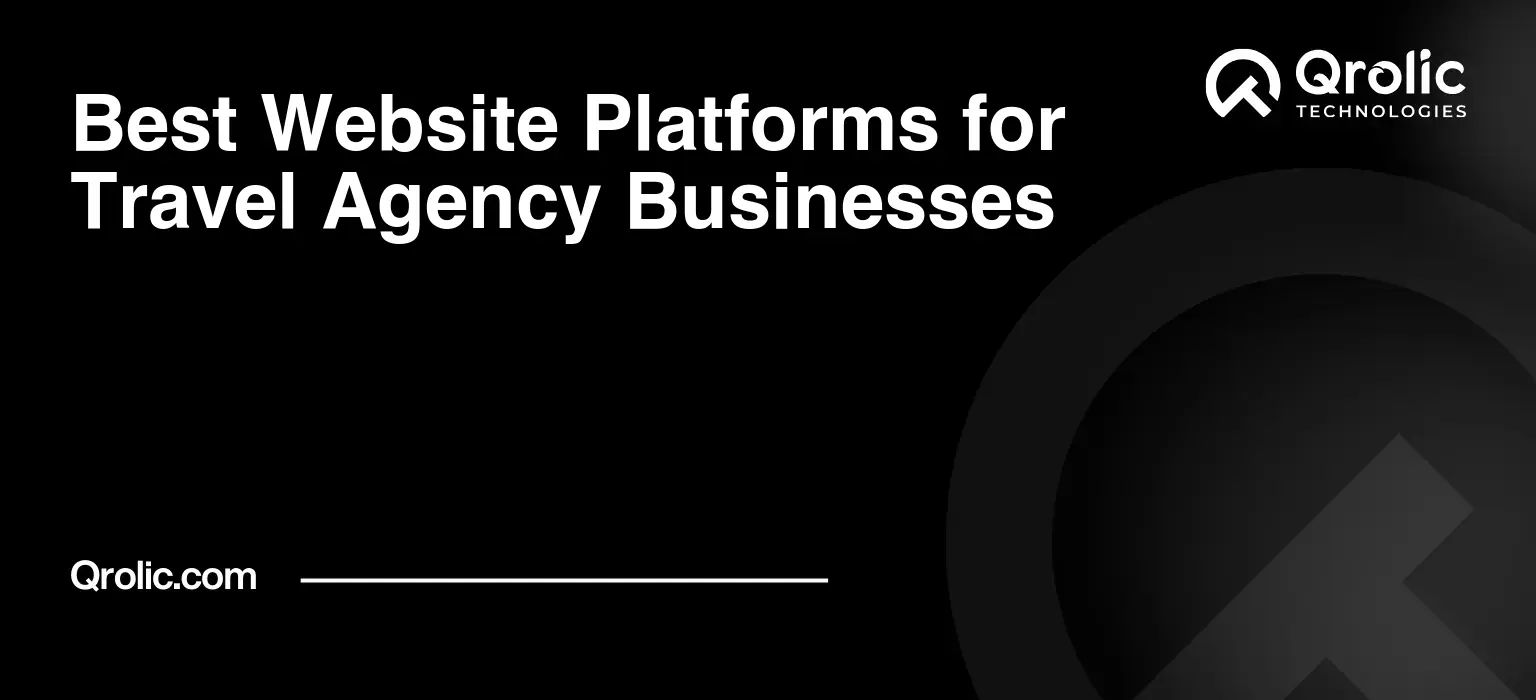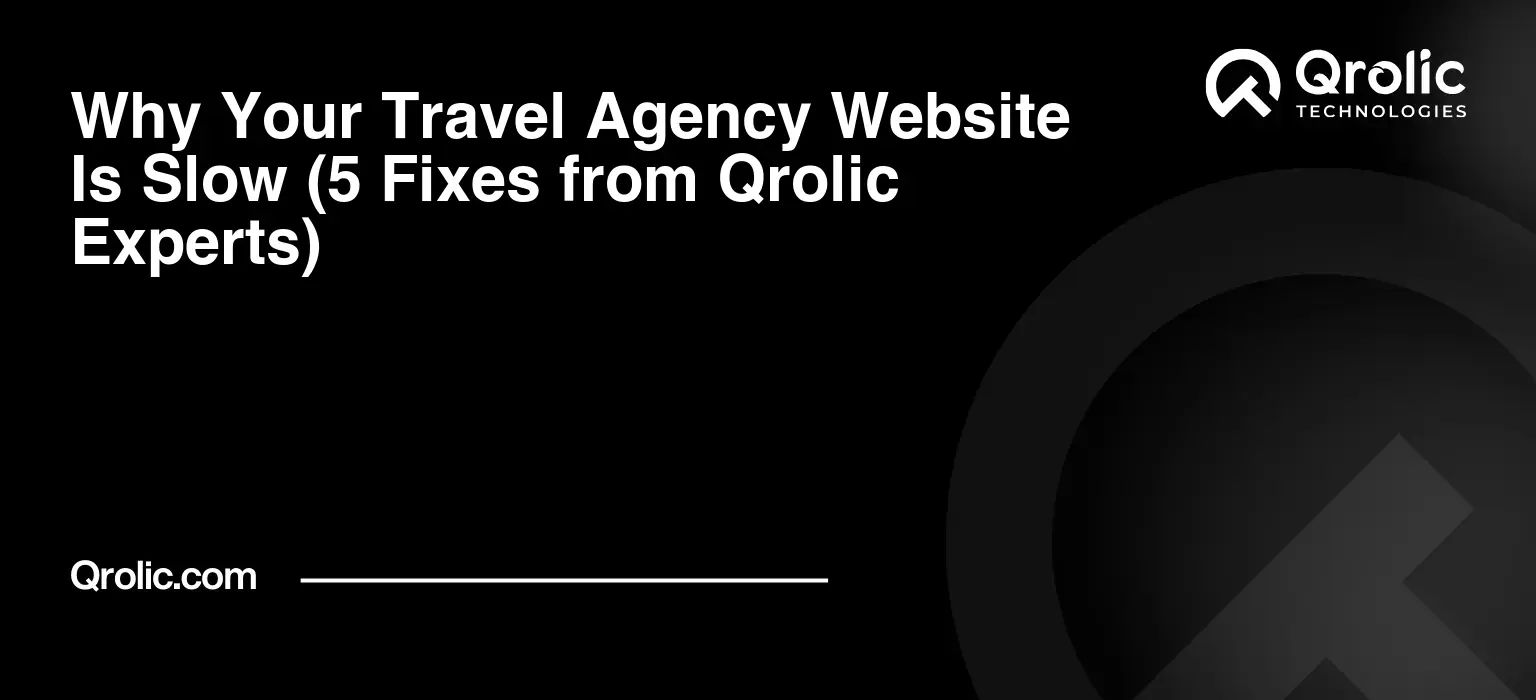Quick Summary:
- Ensure intuitive design and a smooth user experience.
- Provide powerful search and secure, easy booking.
- Build trust with reviews and personalized recommendations.
- Engage customers globally with helpful content and support.
Table of Contents
- 10 Essential Features Every Travel Agency Website Needs for Success
- 1. User-Friendly Interface (UI) & Intuitive User Experience (UX)
- 2. Robust Search and Filtering System
- 3. Comprehensive Destination & Package Pages
- 4. Secure Online Booking & Payment System
- 5. Personalized Recommendations & AI-Powered Features
- 6. Customer Review & Testimonial Integration
- 7. Mobile Responsiveness & Progressive Web App (PWA) Capabilities
- 8. Integrated CRM & Lead Management
- 9. Live Chat Support & Multilingual Capabilities
- 10. Blog, Travel Guides & SEO Optimization Tools
- Qrolic Technologies: Your Partner in Crafting the Ultimate Travel Website
- Conclusion
10 Essential Features Every Travel Agency Website Needs for Success
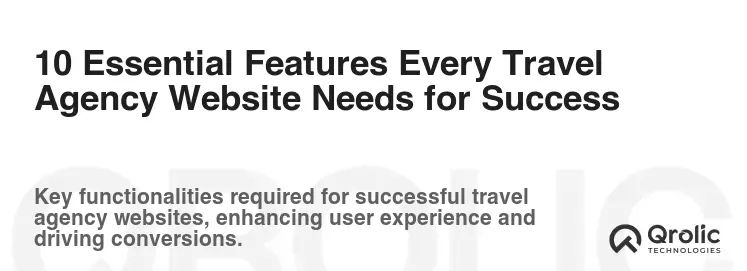
A travel agency website is more than just an online brochure; it’s a dynamic digital storefront, a tireless salesperson, and a trusted guide for dreamers exploring their next adventure. In today’s hyper-connected world, the success of your travel business hinges significantly on the capabilities and appeal of your online platform. To truly thrive, a travel agency website must evolve beyond basic presence to offer an unparalleled user experience, drive conversions, and build lasting customer relationships. Let’s delve into the 10 essential features that form the bedrock of a successful travel agency website.
1. User-Friendly Interface (UI) & Intuitive User Experience (UX)
What it is: The User Interface (UI) refers to everything a user interacts with on your website – the buttons, menus, images, text, and overall visual design. User Experience (UX) encompasses the entire journey a user takes when interacting with your site, including how they feel about the process. A user-friendly UI/UX means the website is easy to navigate, aesthetically pleasing, and provides a seamless, enjoyable experience from landing page to booking confirmation.
Why it’s essential: In the competitive travel industry, first impressions are paramount. A clunky, confusing, or visually unappealing website will deter potential customers faster than anything else. An intuitive UX reduces friction, making it effortless for users to find information, explore destinations, and complete bookings. This directly impacts conversion rates, reduces bounce rates, and fosters trust. Think of it as the friendly, knowledgeable concierge for your digital storefront – always ready to guide with a smile. When users feel comfortable and confident, they are more likely to explore, engage, and ultimately, book their travel through your agency. This core feature is the fundamental building block for all other aspects of a high-performing travel agency website.
How to achieve it:
- Clear Navigation: Implement logical menus, breadcrumbs, and a well-structured sitemap. Users should always know where they are and how to get back.
- Visual Hierarchy: Use design elements (size, color, spacing) to guide the user’s eye to important information and calls to action.
- Whitespace: Don’t clutter pages. Ample whitespace improves readability and makes the design feel clean and professional.
- Consistent Branding: Maintain a consistent color scheme, typography, and tone of voice across all pages to reinforce your brand identity.
- Fast Loading Speed: Optimize images and code to ensure quick page loads. slow websites are a major frustration point.
- Accessible Design: Ensure your website is usable by people with disabilities (e.g., proper alt text for images, keyboard navigation).
Benefits:
- Increased user engagement and time spent on site.
- Higher conversion rates for bookings and inquiries.
- Reduced bounce rates and improved SEO rankings (Google favors user-friendly sites).
- Enhanced brand perception and customer loyalty.
- Positive word-of-mouth recommendations.
Tips for Optimization:
- Conduct A/B testing on different layouts and button placements.
- Gather user feedback through surveys or usability testing.
- Regularly review analytics to identify areas of user drop-off.
- Prioritize Mobile-First Design (discussed further in point 7).
2. Robust Search and Filtering System
What it is: This feature empowers users to quickly and efficiently find specific travel options (flights, hotels, packages, cruises, tours) based on their criteria. It includes powerful search bars, advanced filtering options (price range, dates, destination, number of travelers, star rating, amenities, type of activity, airline, hotel chain, etc.), and sorting capabilities.
Why it’s essential: Travelers often have specific ideas or constraints in mind. A cumbersome search process can lead to frustration and abandonment. A robust search and filtering system acts as a digital travel agent, helping users narrow down countless options to find their perfect match without feeling overwhelmed. It’s a critical component for any online travel agency platform to deliver personalized and relevant results. Without it, your comprehensive offerings remain hidden, leading to lost opportunities. This system is the engine that drives exploration and discovery on your travel booking website.
How to achieve it:
- Comprehensive Search Fields: Allow searching by destination, dates, trip type, interests, and keywords.
- Advanced Filters: Offer a wide range of filters that are relevant to your inventory (e.g., “beachfront,” “family-friendly,” “adventure,” “luxury,” “pet-friendly”).
- Dynamic Filtering: Filters should update in real-time as users make selections, showing only available options.
- “Smart” Search: Implement autocomplete suggestions, typo correction, and semantic search capabilities to anticipate user needs.
- Intuitive Layout: Position the search bar prominently and make filters easy to access and understand.
- Saved Searches/Alerts: Allow users to save their search criteria and receive notifications when new options match.
Benefits:
- Improved user satisfaction and engagement.
- Faster discovery of relevant travel products.
- Increased conversion rates due to tailored results.
- Reduced customer support inquiries related to finding information.
- Ability to showcase the full breadth of your offerings effectively.
Tips for Optimization:
- Analyze popular search queries and frequently used filters to refine your system.
- Ensure filters are always relevant to the displayed content.
- Use clear icons and labels for filters.
- Test the search functionality rigorously for accuracy and speed.
3. Comprehensive Destination & Package Pages
What it is: These are dedicated pages for each destination, tour package, hotel, flight, or activity you offer. They go beyond basic details, providing rich, engaging content designed to inspire and inform. This includes high-quality images and videos, detailed itineraries, descriptions of attractions, local insights, customer reviews, pricing structures, availability, and clear calls to action for booking.
Why it’s essential: Travelers aren’t just buying a trip; they’re buying an experience, a memory, a dream. Comprehensive pages allow potential customers to immerse themselves in the offering, visualizing their trip before they even book. They answer crucial “what, why, and how” questions, building excitement and confidence. These pages are your agency’s storytelling canvas, essential for showcasing your unique value proposition and the unforgettable experiences you provide. For tour operator website features, this is particularly critical as it directly communicates the value of curated experiences.
How to achieve it:
- Stunning Visuals: High-resolution photos, drone footage, and virtual tours that capture the essence of the destination/package.
- Engaging Descriptions: Write compelling, benefit-driven copy that paints a vivid picture of the experience. Focus on emotions and unique selling points.
- Detailed Itineraries: Break down multi-day tours day by day, highlighting activities, accommodations, and meals.
- Pricing Transparency: Clearly display costs, what’s included/excluded, and any potential extra fees.
- Availability Calendars: Show real-time availability and allow users to select dates easily.
- Local Insights: Share insider tips, cultural notes, recommended restaurants, and safety information.
- Related Content: Suggest similar packages, complementary activities, or other destinations that might interest the user.
- FAQs: Address common questions directly on the page.
Benefits:
- Increased user engagement and time on page.
- Higher conversion rates through informed decision-making.
- Reduced pre-booking inquiries due to detailed information.
- Improved SEO by providing rich, relevant content for specific travel queries.
- Enhanced credibility and trust in your agency.
Tips for Optimization:
- Regularly update content with fresh photos, videos, and information.
- Incorporate user-generated content (with permission) like photos from past travelers.
- Use storytelling techniques to make descriptions more compelling.
- Ensure clear, prominent calls to action (e.g., “Book Now,” “Enquire,” “Request a Quote”).
- Optimize content for long-tail keywords related to specific destinations or activities.
4. Secure Online Booking & Payment System
What it is: This is the critical infrastructure that allows users to select travel products, provide personal details, and make payments directly on your website. It includes secure data encryption (SSL certificates), multiple payment gateway options (credit cards, PayPal, digital wallets), clear booking confirmations, and robust backend management for inventory and customer data.
Why it’s essential: Trust is non-negotiable when dealing with personal information and financial transactions. A secure and seamless booking process is the ultimate goal of any travel agency website. Any friction or perceived insecurity at this stage will lead to abandoned carts and lost revenue. Users need to feel absolutely confident that their data is protected and their transaction is safe. This feature directly translates browsing into business, converting interest into confirmed bookings. It’s the moment of truth for your online travel agency platform.
How to achieve it:
- SSL Certificate: Implement HTTPS to encrypt data transmitted between the user’s browser and your server (visible as a padlock icon in the browser).
- Multiple Payment Options: Offer a variety of trusted payment gateways to cater to different customer preferences (Visa, Mastercard, American Express, PayPal, Stripe, etc.).
- PCI DSS Compliance: Ensure your payment processing adheres to industry security standards.
- Clear Transaction Summaries: Before payment, display a detailed breakdown of costs, inclusions, and terms.
- Step-by-Step Process: Break the booking process into clear, manageable steps to reduce cognitive load and prevent errors.
- Error Validation: Provide real-time feedback for incorrect inputs in forms.
- Automated Confirmations: Send instant email confirmations with booking details, receipts, and next steps.
Benefits:
- Increased conversion rates and direct bookings.
- Enhanced customer trust and confidence.
- Streamlined operations and reduced manual booking errors.
- Global reach by accepting various payment methods.
- Improved data security and compliance.
Tips for Optimization:
- Keep the booking form as concise as possible, asking only for essential information.
- Offer guest checkout options alongside account creation.
- Provide clear contact information for support during the booking process.
- Regularly audit your security measures and payment gateways.
- Implement a booking engine that integrates seamlessly with your inventory management.
5. Personalized Recommendations & AI-Powered Features
What it is: Leveraging data about user behavior, preferences, and demographics to offer highly relevant travel suggestions. This can include “customers who viewed this also liked,” personalized package suggestions, dynamic pricing based on demand, AI-driven chatbots for instant support, and smart itinerary builders.
Why it’s essential: In a world saturated with options, personalization stands out. People want to feel understood and catered to. AI and personalization features move beyond generic offerings, creating a bespoke experience that makes users feel valued and understood. This not only improves engagement but significantly boosts the likelihood of conversion by presenting highly appealing options directly to the user. It transforms your travel agency website from a static catalog into a dynamic, intelligent travel advisor. This is one of the best features for travel websites looking to innovate and stay ahead.
How to achieve it:
- Recommendation Engines: Implement algorithms that analyze user browsing history, past bookings, and similar user data to suggest relevant destinations or packages.
- AI Chatbots: Integrate chatbots capable of answering common questions, guiding users through the site, and even assisting with basic booking inquiries.
- Dynamic Content: Tailor website content (e.g., homepage banners, featured deals) based on user location, previous searches, or demographic data.
- Email Personalization: Use browsing data to send targeted email campaigns with relevant offers.
- Smart Itinerary Builders: Allow users to customize aspects of their trip (e.g., add excursions, change hotels) with intelligent suggestions.
- Voice Search Integration: Cater to the growing trend of voice assistants for search queries.
Benefits:
- Increased user engagement and time on site.
- Higher conversion rates through highly relevant offers.
- Improved customer satisfaction and loyalty.
- Efficient customer service through AI chatbots.
- Competitive differentiation and a modern brand image.
Tips for Optimization:
- Start with basic recommendation engines and gradually introduce more complex AI features.
- Ensure data privacy and transparency in how user data is utilized.
- Continuously train AI models with new data to improve accuracy.
- Balance personalization with privacy concerns – always give users control over their data.
6. Customer Review & Testimonial Integration
What it is: A system for collecting, displaying, and managing authentic customer reviews and testimonials directly on your website. This includes star ratings, written reviews, photo/video testimonials, and possibly integration with third-party review platforms (e.g., Trustpilot, Google Reviews).
Why it’s essential: In the travel industry, trust is the ultimate currency. People rely heavily on the experiences of others before making booking decisions. Customer reviews act as powerful social proof, validating your agency’s reliability, service quality, and the value of your offerings. They build confidence, alleviate doubts, and can be the deciding factor for a hesitant traveler. This feature makes your travel agency website a transparent and trustworthy resource. Without authentic reviews, your claims, no matter how good, lack credibility in the eyes of many potential customers.
How to achieve it:
- Prominent Placement: Display reviews on destination pages, package pages, and dedicated testimonial sections.
- Easy Submission: Provide a simple, intuitive way for customers to leave reviews after their trip.
- Filtering & Sorting: Allow users to filter reviews by star rating, date, or specific keywords.
- Authenticity Verification: Implement measures to ensure reviews are genuine (e.g., verified buyer tags).
- Respond to Reviews: Publicly respond to both positive and negative feedback to show you value customer input.
- Schema Markup: Use review schema markup so star ratings appear in search results, boosting click-through rates.
Benefits:
- Significantly increased trust and credibility.
- Improved conversion rates through social proof.
- Valuable feedback for service improvement.
- Enhanced SEO (fresh content, schema markup).
- Increased brand loyalty and community building.
Tips for Optimization:
- Actively solicit reviews from happy customers post-trip.
- Feature high-quality, detailed testimonials prominently.
- Don’t shy away from negative reviews; address them professionally and publicly.
- Integrate photos or videos from reviewers to make them more engaging.
7. Mobile Responsiveness & Progressive Web App (PWA) Capabilities
What it is:
- Mobile Responsiveness: Ensures your website adapts seamlessly to any screen size, from desktops to tablets and smartphones, providing an optimal viewing and interaction experience across all devices.
- Progressive Web App (PWA) Capabilities: Takes mobile responsiveness further by offering an app-like experience within a web browser. PWAs can be added to a user’s home screen, work offline (for certain content), send push notifications, and load instantly, combining the best of web and mobile apps.
Why it’s essential: The majority of online travel research and booking now happens on mobile devices. A non-responsive website is not just inconvenient; it’s a critical barrier to entry. Poor mobile experience frustrates users, drives them away, and significantly harms your search engine rankings. PWAs elevate this experience, offering speed, reliability, and engagement that keeps users coming back. For any travel agency website aiming for broad reach, being mobile-first is no longer an option, it’s a prerequisite for survival and growth. This is how you reach customers when they are looking for travel inspiration, regardless of location or device.
How to achieve it:
- Responsive Design Frameworks: Utilize CSS media queries and flexible grids to ensure layout, images, and text scale appropriately.
- Touch-Friendly Elements: Design buttons and navigation menus that are easy to tap on smaller screens.
- Optimized Images: Serve image sizes appropriate for the user’s device to improve loading speed.
- Readability: Ensure text remains legible without excessive zooming or scrolling.
- PWA Implementation:
- Service Workers: Enable offline capabilities and faster loading.
- Web App Manifest: Provides information about your PWA to the browser (e.g., icons, theme color).
- HTTPS: Essential for all PWAs for security.
- Push Notifications: Engage users with timely offers or updates (with their permission).
Benefits:
- Wider audience reach and accessibility.
- Improved user experience and satisfaction on all devices.
- Higher search engine rankings (Google prioritizes mobile-friendly sites).
- Increased conversion rates, especially from mobile users.
- PWA benefits: enhanced engagement, faster loading, offline access, reduced app development costs.
Tips for Optimization:
- Test your website rigorously on various devices and screen sizes.
- Prioritize essential content and features for mobile users.
- Optimize images and scripts specifically for mobile performance.
- Educate users about the benefits of adding your PWA to their home screen.
- Regularly check Google’s Mobile-Friendly Test tool.
8. Integrated CRM & Lead Management
What it is: A Customer Relationship Management (CRM) system integrated directly with your website allows you to capture, organize, and manage customer and lead data. This includes inquiries from contact forms, booking history, communication logs, email subscriptions, and interactions with your chatbot. A robust lead management system then allows you to nurture these leads through targeted communication and follow-ups.
Why it’s essential: Every visitor to your travel agency website is a potential customer, and every interaction provides valuable data. An integrated CRM ensures that no lead falls through the cracks and that you can provide personalized, timely follow-ups. It helps you understand customer preferences, anticipate needs, and build long-term relationships, transforming one-time bookers into loyal advocates. This is crucial for sustained growth and repeat business, allowing you to effectively manage your sales pipeline and customer lifecycle.
How to achieve it:
- Lead Capture Forms: Integrate web forms (contact, inquiry, newsletter sign-up) directly into your CRM.
- Automated Data Entry: Ensure booking details and customer information automatically populate CRM profiles.
- Communication Tracking: Log all interactions – emails, phone calls, chat transcripts – within the customer’s profile.
- Segmentation: Segment your audience based on demographics, interests, past travel, and lead status.
- Automated Workflows: Set up automated email sequences for abandoned carts, post-trip feedback, or birthday wishes.
- Sales Pipeline Management: Track leads through different stages, from initial inquiry to confirmed booking and post-travel follow-up.
Benefits:
- Improved customer retention and loyalty.
- Higher conversion rates from leads.
- Personalized communication and targeted marketing.
- Streamlined sales processes and reduced administrative burden.
- Comprehensive customer insights for strategic decision-making.
Tips for Optimization:
- Regularly update customer profiles with new information.
- Use your CRM data to identify trends and popular travel interests.
- Train your team on how to effectively use the CRM system.
- Integrate your CRM with email marketing and social media tools for a unified view.
9. Live Chat Support & Multilingual Capabilities
What it is:
- Live Chat Support: A real-time messaging tool embedded on your website, allowing users to instantly connect with a customer service representative (or an advanced AI chatbot) for queries, assistance, or booking help.
- Multilingual Capabilities: The ability to present your website content in multiple languages, automatically detecting or allowing users to select their preferred language.
Why it’s essential: Travel decisions often involve many questions and anxieties. Live chat provides immediate gratification and reassurance, addressing concerns when they arise, preventing users from leaving your site in search of answers. Multilingual support breaks down language barriers, opening your agency to a global audience and demonstrating a commitment to serving diverse customers. Together, these features significantly enhance the customer journey, making your travel agency website truly accessible and globally competitive. It’s about providing human-friendly support and reaching a wider world.
How to achieve it:
- Live Chat Integration: Use popular platforms like Intercom, Zendesk Chat, or Tawk.to.
- Availability Display: Clearly indicate live chat hours or if a chatbot is handling queries outside of hours.
- Knowledge Base Integration: Link your live chat to a FAQ or knowledge base for quick self-service options.
- Proactive Chat: Set up triggers to initiate chat with users who seem to be struggling or spending a long time on a specific page.
- Language Selector: Implement a clear dropdown or flag-based selector for language switching.
- Translation Management System (TMS): Use a robust system for translating content, ensuring accuracy and consistency across languages.
- Localization: Beyond translation, adapt cultural nuances, currencies, and date formats for different regions.
Benefits:
- Instant customer support, reducing frustration.
- Increased conversion rates by resolving pre-booking queries.
- Higher customer satisfaction and loyalty.
- Expanded global market reach.
- Improved brand image as an accessible and customer-centric agency.
- Opportunity to capture leads from chat interactions.
Tips for Optimization:
- Ensure your chat agents are well-trained and knowledgeable.
- Monitor chat transcripts to identify common pain points and improve FAQs.
- Offer human handover from chatbots to live agents when necessary.
- Regularly review and update translated content for accuracy.
- Prioritize languages based on your target markets and existing customer base.
10. Blog, Travel Guides & SEO Optimization Tools
What it is:
- Blog/Travel Guides: A content hub on your website featuring articles, destination guides, travel tips, inspiring stories, and industry news.
- SEO Optimization Tools: Built-in or integrated functionalities that help you optimize your website’s content and technical aspects for search engines (e.g., meta tag editors, keyword analysis tools, sitemap generators, analytics dashboards).
Why it’s essential: To truly succeed, your travel agency website needs to be discoverable. A robust blog and comprehensive travel guides establish your agency as an authoritative voice and a trusted resource in the travel niche. This “pulls” organic traffic to your site by ranking for relevant keywords (e.g., “best places to visit in Japan,” “traveling with kids tips,” “how to plan a budget trip”). SEO optimization tools then ensure that this valuable content, along with your core product pages, is seen and understood by search engines, driving qualified leads to your digital doorstep. It answers the “how to build a travel website” question with a focus on sustainable, long-term growth.
How to achieve it:
- Content Strategy: Plan blog topics around user intent, frequently asked questions, popular destinations, and emerging travel trends.
- High-Quality Content: Create well-researched, engaging, and unique articles that provide genuine value.
- Keyword Research: Use tools to identify relevant keywords (e.g., “travel agency website features,” “best features for travel websites,” “online travel booking platform”) and incorporate them naturally into your content.
- Internal Linking: Link your blog posts to relevant destination or package pages and vice-versa.
- Meta Data Optimization: Ensure every page has unique, compelling meta titles and descriptions.
- Image Optimization: Compress images, use descriptive alt text.
- XML Sitemaps: Submit sitemaps to search engines to help them crawl your site efficiently.
- Google Analytics & Search Console: Integrate these tools to monitor website performance, traffic sources, and keyword rankings.
- Schema Markup: Use schema for reviews, FAQs, and business information to enhance search visibility.
Benefits:
- Increased organic traffic from search engines.
- Enhanced brand authority and trust.
- Long-term lead generation at a lower cost than paid ads.
- Opportunity to answer common customer questions proactively.
- Improved overall website SEO and search engine rankings.
Tips for Optimization:
- Publish content regularly and consistently.
- Promote your blog content across social media channels.
- Encourage comments and engagement on your blog posts.
- Regularly update old content to keep it fresh and relevant.
- Monitor your keyword rankings and adjust your strategy as needed.
Qrolic Technologies: Your Partner in Crafting the Ultimate Travel Website
Building a travel agency website that embodies all these essential features, ensuring seamless integration, robust security, and an unparalleled user experience, can be a complex endeavor. This is where expertise becomes invaluable. Qrolic Technologies stands as a leading force in web development, specializing in crafting bespoke digital solutions that propel businesses forward. With a deep understanding of the travel industry’s unique demands and a commitment to cutting-edge technology, Qrolic Technologies (https://qrolic.com/) is your ideal partner in transforming your vision into a successful online reality.
How Qrolic Technologies Elevates Your Travel Website:
- Custom UI/UX Design: Qrolic’s team of design experts meticulously crafts intuitive and visually stunning interfaces, ensuring your travel agency website is not just functional but truly captivating. They focus on human-centric design, making every interaction a delight for your potential travelers.
- Robust Booking Engines & Payment Gateways: Leveraging years of experience, Qrolic develops secure, scalable, and highly efficient booking systems, integrating multiple payment options to provide a smooth, trustworthy transaction experience for your customers worldwide. They prioritize PCI DSS compliance and implement advanced encryption protocols.
- Advanced Search & Filtering: Qrolic specializes in building powerful search algorithms and sophisticated filtering mechanisms, empowering your users to effortlessly navigate through vast travel inventories and find their perfect trip with precision.
- AI-Driven Personalization & Chatbots: By harnessing the power of Artificial Intelligence, Qrolic can integrate intelligent recommendation engines and AI-powered chatbots, offering personalized travel suggestions and instant support that enhances the customer journey and drives conversions.
- Mobile-First & PWA Development: Understanding the mobile-driven landscape, Qrolic champions mobile-first design, developing fully responsive websites and Progressive Web Apps (PWAs) that deliver lightning-fast performance and an app-like experience across all devices, ensuring your agency reaches every traveler, everywhere.
- Integrated CRM & Analytics: Qrolic provides comprehensive CRM integration, allowing you to effectively manage customer relationships, track leads, automate workflows, and gain invaluable insights into customer behavior. They also set up robust analytics dashboards to help you make data-driven decisions.
- SEO-Optimized Architecture: From the ground up, Qrolic builds websites with SEO best practices in mind, ensuring a clean code structure, fast loading times, schema markup implementation, and content strategies that give your travel agency website the best chance to rank high in search engine results.
Choosing Qrolic Technologies means investing in a future-proof online travel agency platform that not only meets but exceeds industry standards. They don’t just build websites; they build digital ecosystems designed for sustained success, helping your travel agency connect with travelers, convert dreams into bookings, and cultivate lasting loyalty.
Conclusion
The digital landscape for travel agencies is fiercely competitive, yet incredibly rewarding for those who invest in a superior online presence. The 10 essential features outlined above are not just add-ons; they are the fundamental pillars upon which a successful, future-ready travel agency website is built. From the initial impression of a user-friendly design to the critical moment of secure booking, and the ongoing engagement through personalized content and seamless support, each element plays a vital role.
By prioritizing these features, focusing on the user’s journey, and continually optimizing based on data, your travel agency can not only attract but also retain customers in this dynamic industry. Remember, your website is your most powerful tool – make it an inspiring, efficient, and trustworthy gateway to the world for your cherished travelers. Investing in these core functionalities ensures your digital platform is not just present, but truly poised for unparalleled success.
